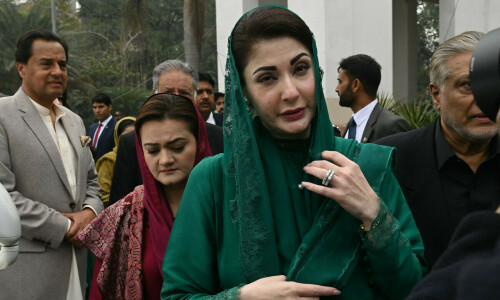ISLAMABAD, June 1: About 95 per cent of the people want the government to cut defence expenditure and give less importance to the defence spending while making budget for the year 2008-09, a survey soliciting proposals for upcoming budget reveals.
About 50 per cent of them give top priority to health and education sector, while 31 per cent say agriculture sector should be given priority for overall economic growth in the country, and 14 per cent give priority to infrastructure.
The survey was conducted by the Human Development and Rights section of the Sungi Development Foundation, a civil society organisation.
Those interviewed during the survey were also invited at a pre-budget seminar organised by the Sungi.
Speaking on the occasion, they stressed that the budget 2008-9 needed to be formulated on the principles of justice, equality and democracy if it was to have any real meaning.
They recommended that “unnecessary” ministries should be abolished to reduce the expenses and defence budget must be brought under the purview of the Parliament.
They were of the view that an integrated development plan was required at the national level to address all the development-related issues.
The participants at the pre-budget seminar were stakeholders including the Sungi’s community partners from the Hazara division and Azad Kashmir, elected and non-elected local government representatives, parliamentarians and representatives of trade unions, and media and concerned citizens were among the respondents.
Other recommendations put forwarded at the seminar included installation of water treatment plants at community level to provide safe drinking water, involvement of youth in sports and cultural activities, provision of quality education to the masses so that they can take part in the socio-economic development of the country.
And they also included considerable cut in the defence budget and allocation of more funds for social sector development, making policies to address the issue of unemployment, reconstruction and rehabilitation of earthquake affected area, taxes cut in coming budget and avoiding imposition of any new taxes, substantial salary increase for government employees, balancing the taxation by bringing in more tax payers, developing a website showing budget details at the national, provincial and district level and structural land reforms to end the poverty.
The recommendations focus on reducing “growing inflation” rate to benefit the poor and salaried class and bigger allocation of funds for women.
The participants at the seminar severely criticised the district governments for allocating meagre funds for the development of social sectors. Chief guest of the seminar, district nazim Haripur, Yousaf Ayub Khan also sought more budget allocations to bridge a huge gap between development and non- development expenditures.
A majority of the participants underlined the need to allocate at least 15 to 20 per cent funds for the development sector.
Most of the participants were of the view that the term “Maximum relief for the poor” was just a political slogan. “Policy makers and decision makers prepare budgets for the rich and the poor get in the quagmire of insecurity,” they noted.
They were of the view that food and energy crisis had been created to keep people’s attention away from the real democratic issues.













































Dear visitor, the comments section is undergoing an overhaul and will return soon.